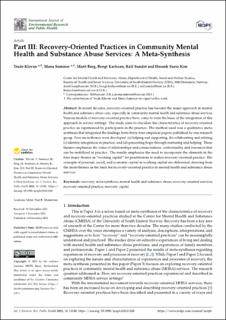Part III: Recovery-oriented practices in community mental health and substance abuse services: A meta-synthesis
Klevan, Trude Gøril; Sommer, Mona; Borg, Marit; Karlsson, Bengt Eirik; Sundet, Rolf; Kim, Hesook Suzie
Peer reviewed, Journal article
Published version
Permanent lenke
https://hdl.handle.net/11250/2838535Utgivelsesdato
2021Metadata
Vis full innførselSamlinger
Originalversjon
Klevan, T., Sommer, M., Borg, M., Karlsson, B., Sundet, R. & Kim, H. S. (2021). Part III: Recovery-Oriented Practices in Community Mental Health and Substance Abuse Services: A Meta-Synthesis. International Journal of Environmental Research and Public Health, 18(24), 13180. https://doi.org/10.3390/ijerph182413180Sammendrag
In recent decades, recovery-oriented practice has become the major approach in mental health and substance abuse care, especially in community mental health and substance abuse services. Various models of recovery-oriented practice have come to form the basis of the integration of this approach in service settings. The study aims to elucidate the characteristics of recovery-oriented practice as experienced by participants in the practice. The method used was a qualitative meta-synthesis that integrated the findings from thirty-four empirical papers published by one research group. Four meta-themes were developed: (a) helping and supporting, (b) collaborating and relating, (c) identity integration in practice, and (d) generating hope through nurturing and helping. These themes emphasize the value of relationships and connectedness, contextuality, and resources that can be mobilized in practice. The results emphasize the need to incorporate the elements in the four major themes as “working capital” for practitioners to realize recovery-oriented practice. The concepts of personal, social, and economic capital as working capital are elaborated, drawing from the meta-themes as the basis for recovery-oriented practice in mental health and substance abuse services.

